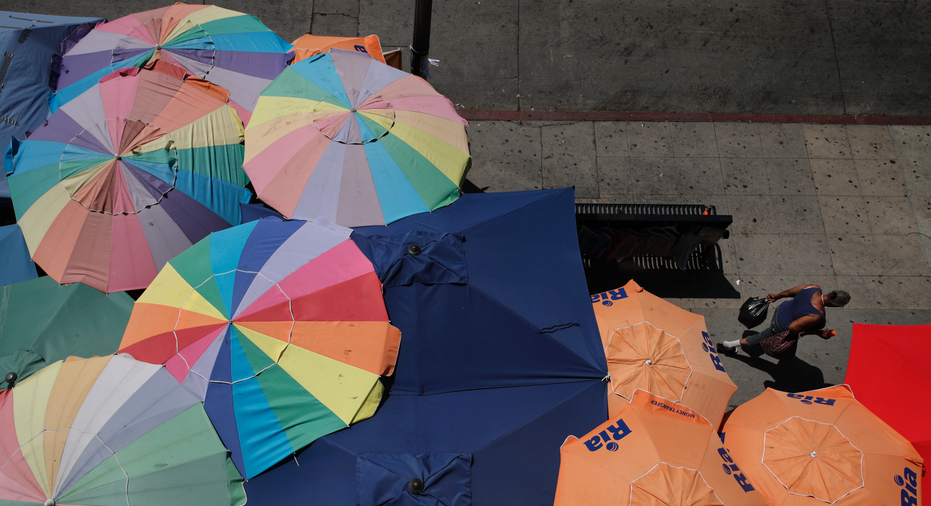LA joins other big cities in legalizing street vending
Mannequin heads with beanies are placed on a table as a young girl looks at goods for sale on a sidewalk Tuesday, Nov. 27, 2018, in Los Angeles. They seem to be everywhere on the streets of Los Angeles - pushcarts and tables filled with everything from hot dogs and tamales to toys and tools. Such sales are illegal, although the law is rarely enforced. Now, after a decade of debate and compromise, the Los Angeles City Council will consider an ordinance Wednesday that would grant permits to sidewalk vendors. (AP Photo/Jae C. Hong)
LOS ANGELES – It was his 63rd birthday but instead of staying home to celebrate Wednesday, Andres Garcia got in his truck and drove 25 miles to Los Angeles City Hall to see the little sidewalk vending business he's run for 15 years finally become legal.
There, in the ornate City Council Chambers, he and more than 200 other sidewalk vendors — "micro-entrepreneurs" as Councilman Curren Price Jr. calls them — rose up to cheer, embrace one another and shout in Spanish, "we won, we won," as the council voted 13-0 to legalize street vending in the nation's second-largest city.
"For us, it's very important," Garcia said of the LA street vendors whose numbers have been estimated as high as 50,000. "If someone complains, the police, they could come in and take everything from us. Make us throw all our stuff away and we lose all our money for that day."
In recent years, police have often looked the other way, he said, but he has been hassled more than once in the past when somebody complained that he stakes out space to sell chips, candy, drinks and other items in Hansen Dam Park, a popular recreational area in the farthest northeast corner of the city's San Fernando Valley.
Passage of the ordinance takes away that risk but marks just the beginning of a new day for street vendors. The city must still implement a system for issuing permits to vendors and to figure out how much to charge for them.
"We need to make sure that these permits don't cost so much that they're burdensome for the vendors," Councilman Bob Blumenfield said.
At the same time, he and other officials added, the price must cover the cost of issuing and enforcing the permits.
Price says it will likely be a year before those details are hammered out and voted on. Leaders of the Los Angeles Street Vendor Campaign and other advocacy groups plan to take part in the discussion.
Los Angeles will join New York, Chicago, San Francisco, Philadelphia and other metropolises in regulating street vendors who sell everything from toys to tacos, T-shirts to cellphones and just about anything else you can think of.
"No longer can we say that of the 10 major cities, Los Angeles is last. That was embarrassing," Blumenfield said.
How to handle street vending in LA has been debated for a decade, and Price noted Wednesday it took five years to shepherd his ordinance to a vote. It might have taken longer if the state Legislature hadn't passed its own street vendor law earlier this year that would have superseded anything Los Angeles did if the city didn't have its own regulations on the books by Jan. 1.
For now, the new city law will require vendors to stay at least three feet from one another, keep their areas clean, and not block sidewalks or inhibit people from entering brick-and-mortar businesses. Selling illegal stuff such as pirated CDs or DVDs remains illegal. If food is sold, the vendor must have the required license from the Los Angeles County Department of Public Health.
Lourdes Madrigal and other vendors say they already do those things.
Six days a week, she rises before dawn to fill her pushcart with her freshly made tamales, tortas, burritos, oatmeal and other breakfast staples served with salsa and champurrado.
She's on the street by 4 a.m., in time to catch the big breakfast eaters — construction workers headed into downtown Los Angeles from the East Side neighborhood of Boyle Heights.
"People can feel more comfortable just doing their job now and not being in fear of having their stuff just thrown away," she said.
The mother of a 2-year-old daughter she cradled during the hearing got into the business five years ago, when she says she was alone and broke. Things have gotten better since then. The work is hard, but the money isn't bad.
"It pays the rent," she says with a smile.
After the council vote, she and more than 200 others, many wearing T-shirts proclaiming, "Legalize Street Vending," streamed out of City Hall for a celebration on the south lawn. Food vendors were waiting for them.
"Who wants a churro," Price shouted triumphantly as other offerings — shaved ice, tropical drinks, chili dogs — went on sale nearby.





















